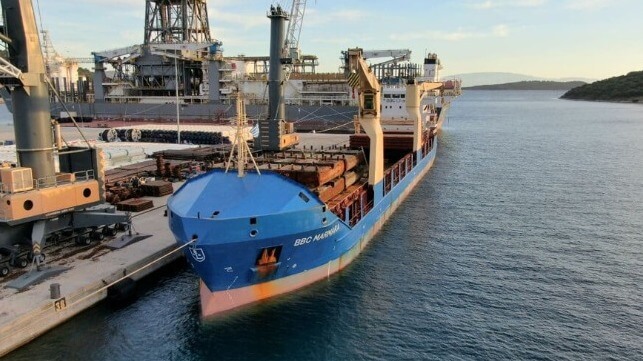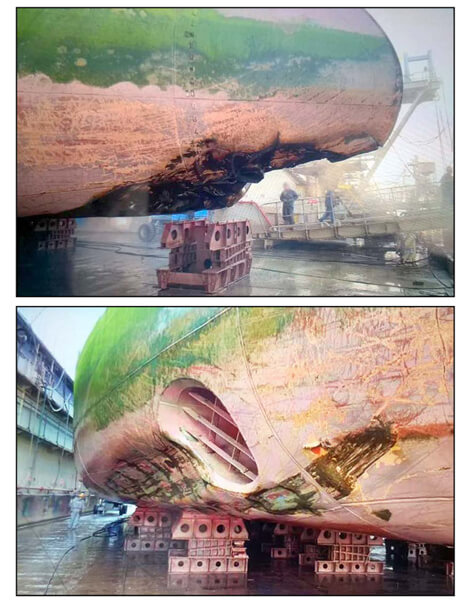UK MAIB: Watch Officer was Sleeping and Likely Drunk as Cargo Ship Grounds

The UK Marine Accident Investigation Branch (MAIB) issued a damming report today investigating the 2021 grounding of a cargo vessel on the west coast of Scotland. They identify issues including the fact that the watch officer was likely drunk and sleeping when the vessel grounded as well as endemic issues in the industry of falsifying records and disabling bridge alarms. The local control station was also overwhelmed and distracted by other duties meaning it failed to challenge the vessel as it failed at several steps before the grounding.
The findings were considered sufficiently alarming that MAIB followed up its specific recommendations to the shipping company, Briese Schiffahrts of Germany in the case and to the Maritime and Coastguard Agency, with a broader safety flyer to the shipping industry. They are warning of the dangers of “circumvention of navigational safeguards.” They are urging ship owners and managers to carry out detailed and accurate reviews looking at the use of lookouts and navigational systems while highlighting in the report the frequent violations or flagrant falsifying records. The issue of ships disregarding the requirement for lookouts at night and in low visibility situations has surfaced recently in other cases such as collisions in the North Sea, including the fatal collision of the Scot Carrier and Karin Høj in December 2021.
The 46-page report details the investigation into the grounding of the BBC Marmara, a 5,344 GT multipurpose dry cargo vessel built in 2010 and registered in Portugal. Manning requirements called for 12 crew to be aboard and the vessel was properly staffed with 11 Russian/Ukrainian nationals and one German.
The vessel departed Ireland on July 23, 2021, carrying 1,407 metric tonnes of reinforced concrete beams and was sailing to Scotland. The approved routing called for the vessel to navigate the Scottish coast to the port of Scrabster on the north coast of Scotland.
On the evening of July 24, the second officer, a 37-year-old Ukrainian who had been working for Briese since 2014, was in the cabin of the vessel’s able seaman along with a cadet. He later admitted that he was drinking beer and had a Jagermeister, a German drink that is 35 percent alcohol by volume, for three hours before his watch. Shortly before midnight, he went to the bridge and did a handover and conversation with the master of the vessel before taking the watch. The report does not address if the master observed any signs of drinking.
The drinking, however, did not stop there. Shortly after his watch began, the AB and cadet joined him on the bridge and were drinking beers, which they said the master had given them. They were also talking and the report says music was played.
Shortly after 0200, the BBC Marmara overshot a planned course alteration, and the Electronic Chart Display (ECDIS) and Information System’s alarm began sounding. It rang 15 times before a course correction was made. About 40 minutes later, the vessel missed a reporting call to the traffic monitoring station and at 0330 the ECDIS “look ahead alarm” went off. The vessel was moving at 11.2 knots and two minutes later went aground causing what MAIB describes as “significant damage,” with a survey showing the bow thruster and forepeak tank were penetrated.

Damage pictures from MAIB report
During their investigation, the review of the vessel’s voyage data recorder picked up “loud snoring” at 0248 and it continued intermittently as the vessel crossed its planned track. Despite Briese’s written policy saying a lookout was mandatory during darkness and restricted visibility, they found the second officer was alone on the bridge except for the brief period when he was socializing. They also noted that the shipping line’s policy prohibited the consumption of beverages above 19 percent alcohol while onboard.
The logs indicated however that a lookout was present. MAIB writes in the report, “It has become accepted practice on aboard to falsify documentation to satisfy the requirement of port state, flag state, and internal audits and inspections.” They also found that the crew considered the Bridge Navigational Watch Alarm System “an inconvenient distraction” and frequently disabled it as well as setting “inappropriate” limits on the ECDIS.
The final safeguard in this instance, the Stornoway MRCC, they found was distracted by another task. The VTM operator on duty was busy and failed to challenge the BBC Marmara. MAIB says staffing was at recommended levels but it did not reflect the other required functions of the staff when multiple incidents were underway. The report also notes that this was the third grounding of a general cargo vessel within the UK coastguard monitored area in a three-year period.
The ship owner and the Maritime and Coastguard Agency responded to the report and findings taking specific actions. MAIB however calls for a study of personnel issues and the impact of tasks for the MCA while calling for Briese to implement crew resource efforts and review and implement management assurance tools. At the same time, they are cautioning the broader industry that this and other similar recent cases highlight the need to adhere to navigation safeguards.
No comments:
Post a Comment